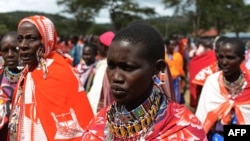Kenya is fighting female genital mutilation by sheltering at-risk girls at a boarding school in the Maasai region.
Deputy head teacher Lucy Itore has rescued more than 100 girls and sheltered them at the Ilbisil Boarding Primary School in Kajiado, where the Maasai live and practice FGM.
FGM is a cultural practice that practitioners say ensures a girl’s purity and eligibility for marriage. A family member or practitioner often performs the cutting and mutilation of a girl’s genitals.
Sometimes the cut removes the clitoris. Sometimes the vulva is sliced and sewn up, leaving a small channel. Sometimes all a girl’s external genitalia are removed.
The painful procedure is debilitating physically and psychologically, survivors say. Some girls have bled to death or died from infection when dirty razors or knives were used.
According to the United Nations Population Fund (UNFPA) the practice is found in communities around the world.
While FGM is a crime under federal law, it is legal in 26 U.S. states. Sweden prosecutes parents who take a girl out of the country to be mutilated.
Peninah Tombo, a Maasai retired nurse and human rights activist, said girls experience intense pain during the ritual cut, still a common practice among the Maasai community.
But activists, educators and officials are fighting back.
“This December holiday we’ve rescued over 30 girls,” Itore said. “Some of them have gone through the cut. Through the help of [local officials], we have been able to rescue many girls in this area.”
One of the girls living at the school is Mary, 13. She said her parents performed FGM on her four years ago.
“My dad came to school and requested for permission from my teachers to allow me go home,” she explained. “I went home and at around 9 p.m. that night, my parents forced me to undergo the ritual cut.”
Most cases are carried out in secret. Kenya outlawed FGM in 2011. If caught, perpetrators face a minimum three-year jail term or fine, and life imprisonment if a girl dies from the ritual practice.
Because of the arrest threat, families are carrying out the practice earlier and earlier to ensure a girl’s eligibility for marriage. Critics argue that when a girl’s parents are arrested and jailed, that leaves the girl and her siblings alone and imperiled.
“What’s happening now is that they are doing it silently. Girls are taken through the FGM at night,” Itore said. The parents of a girl she rescued pretended that they reconciled with the girl, she said. They took her home and mutilated her.
“It’s painful, having kept her at the center for four years, and within a twinkle of an eye she has gone through FGM.”
Family's wrath
Rescuers sometimes face the wrath of families of rescued girls.
“When we started I was about to be killed, because … the stepfather was wondering why I should rescue the girls instead of them being married off,” Tombo said. “He thought of killing me … It is not an easy job. You have to sacrifice your life. It’s a matter of life and death.”
Itore’s program is unique because when she enters villages, she is accompanied by police. So far, she has saved more than 140 girls who are under her care on the school compound.
The deputy head teacher said, unlike many girls from her community, she was lucky to escape FGM and attend school. But it was not with her parent’s total approval.
“I was lucky that my parents took me to school. They educated me up to high school,” she explained. “But immediately after high school I disagreed with my father because he wanted to marry me off.
“I ran away and went to stay with my uncle. … I was lucky that I had an educated uncle in Nairobi. I ran to his place and rescued me.”
Itore studied at college and became a teacher. Her boarding school houses about 50 girls.
“It’s a bit hard because we have to look for school fees, and money for personal use,” Itore said.
More than 125 million women have been mutilated in 29 countries in Africa and the Middle East, according to the World Health Organization (WHO), which condemns the practice as a "violation of the human rights" of women.
Tombo underwent genital cutting at the age of 11. The retired nurse said she was devastated. Now, she spends most of her time helping Maasai girls escape FGM and forced early marriage.




